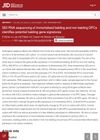11 citations,
July 2014 in “Clinical Rheumatology” Cyclophosphamide often causes gastrointestinal issues, hair loss, and low blood cell counts in Chinese patients with autoimmune diseases.
 7 citations,
January 2018 in “International Journal of Trichology”
7 citations,
January 2018 in “International Journal of Trichology” Taking 5 mg/day finasteride can cause side effects in women with hair loss, but these are usually mild and fade over time, making the treatment beneficial in the long run.
 6 citations,
December 2022 in “Cell reports”
6 citations,
December 2022 in “Cell reports” Eating a high-fat fish oil diet caused mice to lose hair due to a specific immune cell activity in the skin linked to a protein called E-FABP.
1 citations,
August 2021 in “Cosmoderma” Low-dose oral minoxidil is effective and well-tolerated for treating hair loss.
 1 citations,
May 2016 in “Current Opinion in Pediatrics”
1 citations,
May 2016 in “Current Opinion in Pediatrics” Children's hair loss can be caused by various factors and should be treated with appropriate, age-specific methods and psychological support.
 January 2021 in “Turkiye Klinikleri Journal of Dermatology”
January 2021 in “Turkiye Klinikleri Journal of Dermatology” Many young men with hair loss have low levels of vitamin D and B12.
 February 2013 in “Journal of the American Academy of Dermatology”
February 2013 in “Journal of the American Academy of Dermatology” Certain gene variations may increase the risk of alopecia, and platelet-rich plasma treatment can improve hair density in those with hair loss; a rare case of facial Becker's nevus was linked to uneven beard growth.
 March 2011 in “European Urology Supplements”
March 2011 in “European Urology Supplements” Blood tests for tumor cells could improve prostate cancer diagnosis and treatment; hair loss severity linked to a gene affecting prostate conditions.
January 2022 in “Clinical Cases in Dermatology” A 22-year-old man has alopecia areata, an autoimmune hair loss condition, with various treatments available.
 January 2022 in “Clinical Cases in Dermatology”
January 2022 in “Clinical Cases in Dermatology” A condition called Central Centrifugal Cicatricial Alopecia causes hair loss and scalp burning in middle-aged African women, and it's treated with various medications, hair transplants, and non-drug methods like wigs.

Alopecia areata, a type of hair loss, may be passed through T cells and has genetic links, while treatments vary in effectiveness. Male pattern baldness can be treated with finasteride and is influenced by androgens in hair follicles.
28 citations,
November 2018 in “American Journal of Medical Genetics Part A” ODC1 gene mutations cause a neurodevelopmental disorder with large head size, hair loss, and facial abnormalities.
 5 citations,
September 2021 in “Frontiers in Cell and Developmental Biology”
5 citations,
September 2021 in “Frontiers in Cell and Developmental Biology” Dihydrotestosterone treatment on 2D and 3D-cultured skin cells slows down hair growth by affecting certain genes and could be a potential target for hair loss treatment.
 3 citations,
April 2016 in “PubMed”
3 citations,
April 2016 in “PubMed” Using Minoxidil 5% foam with a botanical hair solution twice daily can significantly improve hair growth and appearance in men with hair loss, and is generally well-tolerated.
 1 citations,
May 2017 in “InTech eBooks”
1 citations,
May 2017 in “InTech eBooks” Some natural remedies may help with hair regrowth, but more research is needed to confirm their effectiveness and safety.
 December 2022 in “Journal of Plant Biotechnology/Sigmul saengmyeong gong haghoeji/Journal of plant biotechnology”
December 2022 in “Journal of Plant Biotechnology/Sigmul saengmyeong gong haghoeji/Journal of plant biotechnology” A new peptide from ginseng berries may help prevent hair loss by promoting cell growth and reducing stress damage.
 September 2014 in “Springer eBooks”
September 2014 in “Springer eBooks” Aging causes hair to gray and thin, with the timing of graying varying by race, and factors like oxidative stress and genetics can lead to hair loss.
 September 2021 in “Journal of The American Academy of Dermatology”
September 2021 in “Journal of The American Academy of Dermatology” COVID-19 patients often experience temporary hair loss and scalp pain.
 7 citations,
January 2017 in “Skin Pharmacology and Physiology”
7 citations,
January 2017 in “Skin Pharmacology and Physiology” ECOHAIR® lotion is effective and safe for improving hair growth and reducing hair loss.
 2 citations,
May 2021 in “Journal of the Endocrine Society”
2 citations,
May 2021 in “Journal of the Endocrine Society” Men with high genetic risk for Polycystic Ovary Syndrome (PCOS) have increased chances of obesity, type 2 diabetes, heart disease, and hair loss, showing PCOS risk factors can affect both genders.
1 citations,
October 2022 in “JAAD case reports” Low-dose oral minoxidil can cause serious heart complications.
 November 2022 in “Scientific Data”
November 2022 in “Scientific Data” The research identified genes and non-coding RNAs in cells that could be affected by testosterone, which may help understand hair loss and prostate cancer.
 November 2022 in “Journal of Investigative Dermatology”
November 2022 in “Journal of Investigative Dermatology” The research found specific genes that are more active in balding cells, which could be causing hair loss.
Sesa oil, Keshking oil, and Parachute oils were the most available hair loss treatments in Bhilai-Durg city during 2011-12.
 January 2008 in “The Year book of endocrinology”
January 2008 in “The Year book of endocrinology” Gene variant linked to prostate cancer, hormone levels, and hair loss.
 3 citations,
March 2014 in “Journal of Industrial Microbiology & Biotechnology”
3 citations,
March 2014 in “Journal of Industrial Microbiology & Biotechnology” Scientists found a new gene in a bacterium that can modify an immunosuppressant drug, potentially helping to treat hair loss.
 January 2022 in “Przegla̧d dermatologiczny”
January 2022 in “Przegla̧d dermatologiczny” Minoxidil, a medicine initially for high blood pressure, can stimulate hair growth and is promising for treating hair loss, but it may cause side effects like itching and dizziness.
 7 citations,
January 2022 in “Plants”
7 citations,
January 2022 in “Plants” Rice husk and bran extracts from the Bue Bang 3 CMU variety can potentially treat hair loss due to their antioxidant, anti-inflammatory, and anti-androgenic properties.
 290 citations,
December 2017 in “Journal of The American Academy of Dermatology”
290 citations,
December 2017 in “Journal of The American Academy of Dermatology” Alopecia areata is an autoimmune condition causing hair loss, influenced by genetics, stress, and diet, and may be prevented by a high soy oil diet.
 98 citations,
February 2007 in “Seminars in Cell & Developmental Biology”
98 citations,
February 2007 in “Seminars in Cell & Developmental Biology” Androgens can both stimulate and cause hair loss, and understanding their effects is key to treating hair disorders.























